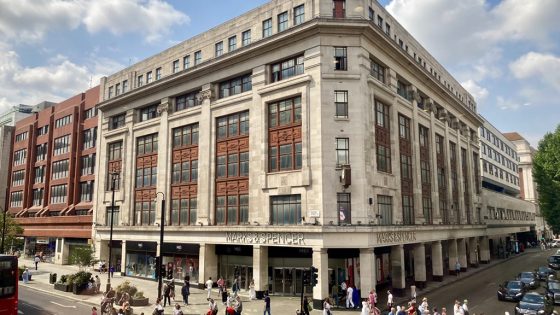The High Court has overturned housing secretary Michael Gove’s decision to block Marks & Spencer’s controversial Oxford Street redevelopment.
Justice Lieven upheld M&S’s appeal against the decision on Friday morning (1 March) in a blow to campaigners, who objected to the carbon impact of demolishing and rebuilding the retail giant’s 95-year-old flagship store in central London.
M&S operations director Sacha Berendji hailed the end of a “long, unnecessary and costly delay” to the project.
He said: “Today’s judgement couldn’t be clearer. The court has agreed with our arguments on five out of the six counts we brought forward and ruled that the secretary of state’s decision to block the redevelopment of our Marble Arch store was unlawful.
“The secretary of state now has the power to unlock the wide-ranging benefits of this significant investment and send a clear message to UK and global business that the government supports sustainable growth and the regeneration of our towns and cities.”
Westminster City Council granted planning permission in November 2021 for M&S to build a new 10-storey mixed-use development in place of its existing building.
The project was stalled after Gove called an inquiry into the scheme in June 2022. Campaign group SAVE Britain’s Heritage told the inquiry that M&S’s plans would create more carbon emissions than “driving to the sun”.
Against the recommendation of a planning inspector, Gove ultimately rejected the scheme last July, citing heritage harm and the carbon footprint of demolition and rebuilding.
Justice Lieven accepted M&S’s claims that Gove had incorrectly assessed the presumption in favour of reusing buildings in the National Planning Policy Framework; the consideration of alternatives; the balance of public benefits against heritage impacts; harm to the vitality and viability of Oxford Street; and embodied carbon policy.
She did not accept the retailer’s claim that Gove had erred in his analysis of the impact of the scheme on the neighbouring Selfridges and Stratford Place buildings.
The option for Gove to appeal the High Court’s decision remains open.
A spokesperson for the Department for Levelling Up, Housing and Communities said: “We acknowledge the judgement and are considering our next steps. It would be inappropriate to comment further at this stage.”
The decision has received a mixed reaction from different quarters.
Henrietta Billings, director of SAVE Britain’s Heritage, one of the defendants in the High Court appeal, said: “This case has focused widespread public attention on the wasteful knock it down and build again process that has dominated our construction sector for the past 100 years.
“Now in 2024 people are demanding action. We need a fresh, positive approach to re-using historic buildings and saving precious resources.”
A spokesperson for the National Federation of Demolition Contractors (NFDC) said: “The NFDC is glad to see today’s High Court ruling, though it is unfortunate that the operations of a prime site in one of the UK’s flagship retail districts has been disrupted, delaying its much-welcomed carbon footprint improvements.
“We applaud the team at M&S and everyone involved in the project for championing a sensible mindset to sustainable redevelopment, which considers the entire life cycle of the site, rather than applying a ‘one-size-fits-all’ approach.”
James Souter, partner at law firm Charles Russell Speechlys, said: “This case goes to the heart of an uneasy tension between the protection of heritage assets, environmental concerns and developmental potential.
“Today’s decision will be embarrassing for the government, not least because of the public perception on the costs incurred.
“It could also give developers greater confidence in bringing forward contemporary new-build schemes, even where the possibility of retrofitting existing structures is theoretically possible.”

